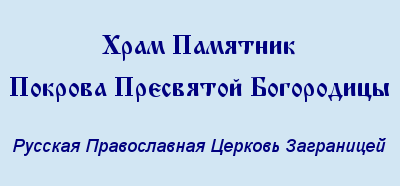Dear Brothers and Sisters,
Congratulations with the feast of the Resurrection of the Lord and the after-feast of the Nativity of the Most-Holy Mother of God!
Last week we discussed the last of the Seven Ecumenical Councils, which met in 787 in Nicea. We could ask the question, what came next? Is it really possible that after the Seventh Council there were no more theological disputes and ecumenical councils no longer met? Of course, there were both disputes and authoritative councils, but for some reason these councils are not called ecumenical. Today let’s take note of several of them.
Many people hold that an eighth Ecumenical Council really did take place when another council met in Constantinople in the years 879-880. It was attended by 400 hierarchs, including representatives of the Pope of Rome and all the Eastern Orthodox patriarchs. This council gathered to discuss two main issues. The first was to judge as legitimate the election of the Holy Hierarch Photius to the patriarchal throne of Constantinople, which was challenged by the Western Church for some time. This council also very accurately and clearly expressed the idea that it is impermissible to change the Orthodox faith of the holy apostles, the holy fathers, and the seven Ecumenical Councils, and that this faith is expressed in the Symbol of Faith, which was adopted at the Second Council and confirmed by all the following councils. This expression of the faith was not issued by chance, but was proclaimed as a defense against the practice of many western Churches of adding to the Creed the words that the Holy Spirit proceeded not only from the Father, but also from the Son. As we all know, the Western Church did not reject this erroneous teaching, and in the 11th century, it was this teaching that led to the separation of the western Christians from the Eastern Church.
There was also a series of three councils in the 14th century (1341, 1347, и 1351), which can be counted as the ninth Ecumenical Council. All three of these councils met in Constantinople and were concerned with the theological disputes between the Holy Hierarch Gregory Palamas and Barlaam the Calabrian. Barlaam, a well-educated Greek monk and philosopher from southern Italy, was troubled by the idea that simple uneducated monks can truly come to know God through prayer. He taught that it was impossible to commune with the being or essence of God, and that it is only possible to see some of God’s actions in our world through diligent study.
The Holy Hierarch Gregory, who was also a marvelously educated person, but at the same time had much monastic experience, came to the defense of the Athonite monks, who were called hesychasts (that is, ones who are still, or quiet, recluses). St. Gregory Palamas noted that of course, the essence of God is impossible for man to know, but that God manifests Himself in the world through His uncreated energies, or, in other words, through grace. Any person, not just a monk, can acquire grace and truly come to know, or see, or commune with God through prayer, good deeds, ascetic struggles, and the mysteries of the Church. As an example of this, Gregory Palamas gave the Transfiguration of the Lord and said that the apostles saw not a usual earthly created light, but an uncreated divine light, and that in such a way, they communed with God Himself. Barlaam did not share this belief, but insisted that the light of Mount Tabor, just like all the other manifestations of God’s grace amongst people here on earth, was created.
The councils of the 14th century confirmed the traditional Orthodox teaching which was so eloquently and clearly expressed by the Holy Hierarch Gregory and condemned Barlaam and his supporters. These councils are important because they, like the seven Ecumenical Councils, defended an important idea of Orthodox theology – that it is possible to know God, not only in an abstract academic way, but also in a personal manner and to draw close to Him, commune with Him, to in the most literal sense become a member of His Body, or, in the words of the hesychasts to become god-like.
Each one of us understands this well, because at some moment of our own lives each of us has felt the presence of God, has felt grace acting on us. We must diligently remember these moments and always endeavour to have the grace of God sanctify us. Therefore, let’s try to cleanse ourselves of our sins and sinful thoughts, let’s rise more often to pray, let’s serve our neighbour, and, in such a way, let’s hope that we will create a fitting place in our hearts for the grace of God.
priest Alexis







